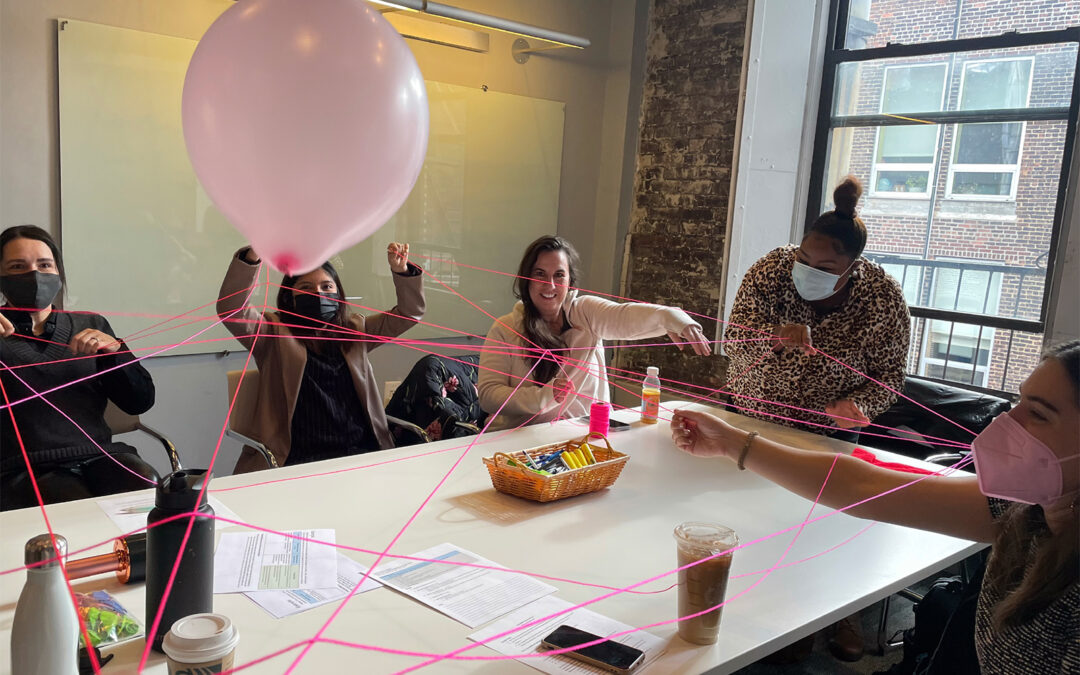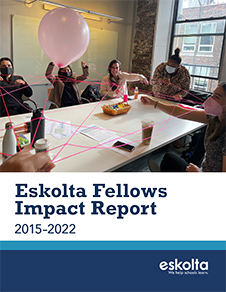Since 2015, the Eskolta School Improvement Fellows Program has supported and trained 101 fellows in four key areas: leadership, community, critical conversations about equity and race, and designing change in schools. The work of the Fellows Program mirrors the work of our organization: we know that transforming our schools into spaces that wholeheartedly welcome, celebrate, and support students — especially those who identify as Black, Indigenous, or people of color who are often marginalized by the system — is a collective effort.
A short history of the Fellows Program
That’s why in 2015, we launched the Fellows Program to offer talented educators support and tools to lead equitable change in their schools. The next year, we worked with the NYC Department of Education to work with its College Access for All counselors in a separate coaching program. Now, the Fellows Program supports both teacher leaders and counselors because we believe they both have the expertise to lead change in schools together.
Impact highlights
We surveyed our past fellows to gauge the impact of the four key areas of the program:
- Leadership: Fellows receive training in how to advocate, design, and pilot adult learning projects. Since 2015, one out of five fellows surveyed had moved into a leadership position within schools, districts, or nonprofits. Additionally and importantly, 98 percent of those who stayed in their roles as teachers and counselors took on leadership responsibilities such as leading professional development, acting as mentors, and supervising staff.
- Community: Fellows build a community of peers whom they can trust and explore solutions within the program. Over the years, 71 percent of fellows respond that they have a positive perception of being in community with educators from other schools.
- Criticality: The Fellowship is rooted in self reflection, exploration of equity-based frameworks, and critical conversations about race and identity. For example, 100 percent of respondents reported reflecting on their own culture and identity — and that of their students and families — as part of their practice.
- Design: Fellows learn continuous improvement tools and use them to design, test, adapt, and measure the impact of a focus practice, leveraging data to inform and guide success. Ninety-five percent of respondents draw on student voice to understand the problem from students’ perspectives, uncover assumptions, and get feedback.
The future
At its core, the Fellows Program has created a community of educators dedicated to the thoughtful transformation of schools. Our next step is to build out this powerful network of alumni and provide ways to better connect with one another.
We also plan to expand to other stakeholders — those who are involved in educational improvement: students, school leaders, and district staff. We are in the second year of running the Youth Participatory Action Research Fellows Program for students in transfer schools. And, this year, we’re planning to pilot an Inclusive Leadership Fellowship for educational leaders.
We are focused on expansion as we know that we must engage the full diversity that exists within our systems across the country. That’s why we hope to bring our Fellows programs to our newest regions — Boston and Washington, DC. We also aim to broaden our recruitment efforts.
For a full recap of the Fellows Program and to read about our hopes for the future, access the impact report here.


